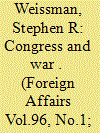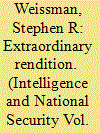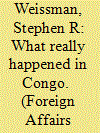| Srl | Item |
| 1 |
ID:
149640


|
|
|
|
|
| Summary/Abstract |
It is easy to conclude that the U.S. Congress is simply incapable of playing a constructive role in matters of war and peace. Paralyzed by gridlock, the hyperpartisan body regularly betrays its constitutional responsibility to act as a serious check on the executive branch, often preferring instead to launch ideological crusades aimed at scoring political points. Congress has spent thousands of hours on deeply partisan investigations of the murders of four U.S. officials and contractors in Benghazi, Libya, but refrained from making any decision on the military intervention that brought them to that chaotic city in the first place. Although the Obama administration began arming and training rebels in Syria over three years ago, neither chamber of Congress has held a debate over the U.S. policy in the civil war there.
|
|
|
|
|
|
|
|
|
|
|
|
|
|
|
|
| 2 |
ID:
097237


|
|
|
| 3 |
ID:
132111


|
|
|
|
|
| Publication |
2014.
|
| Summary/Abstract |
It didn't take long for Congo's transition from Belgian colony to sovereign state to turn ugly. Both the Soviet Union and the United States were keeping a close eye on the mineral-rich country at the heart of Africa when, on June 30, 1960, it gained independence under a democratically elected government headed by Prime Minister Patrice Lumumba. A charismatic nationalist, Lumumba led the only party in parliament with a nationwide, rather than ethnic or regional, base. Within days, however, Congo's troops mutinied against their all-white officer corps (a holdover from the colonial era) and started terrorizing the European population. Belgium responded by sending forces to reoccupy the country and helping Congo's richest province, Katanga, secede. The United States, declining the appeals for help from the new Congolese government, instead threw its support behind a UN peacekeeping mission, which it hoped would obviate any Congolese requests for Soviet military assistance. But Lumumba quickly came into conflict with the UN for its failure to expel the Belgian troops and end Katanga's secession. After issuing a series of shifting ultimatums to the UN, he turned to Moscow for help, which responded by sending transport planes to fly Lumumba's troops into Katanga.
|
|
|
|
|
|
|
|
|
|
|
|
|
|
|
|